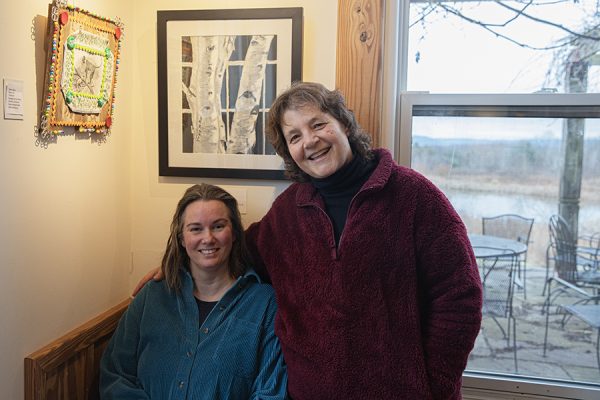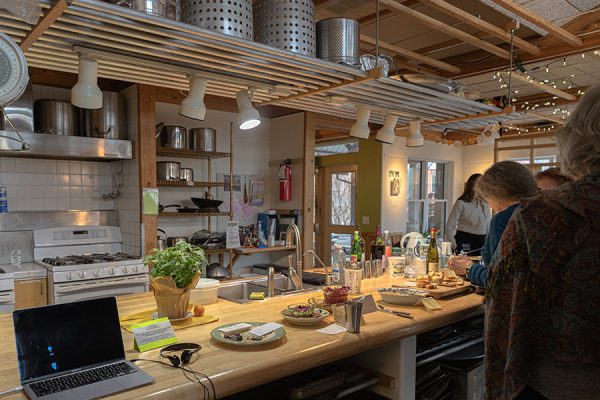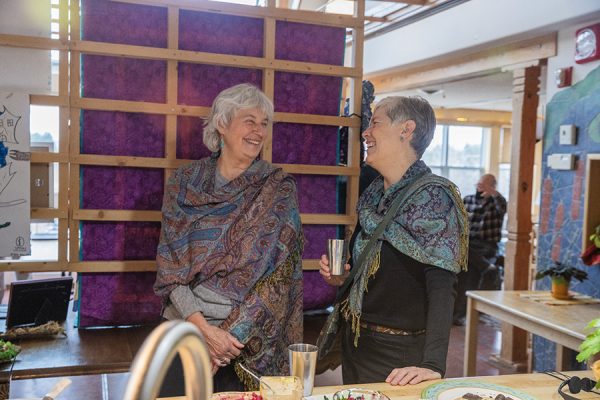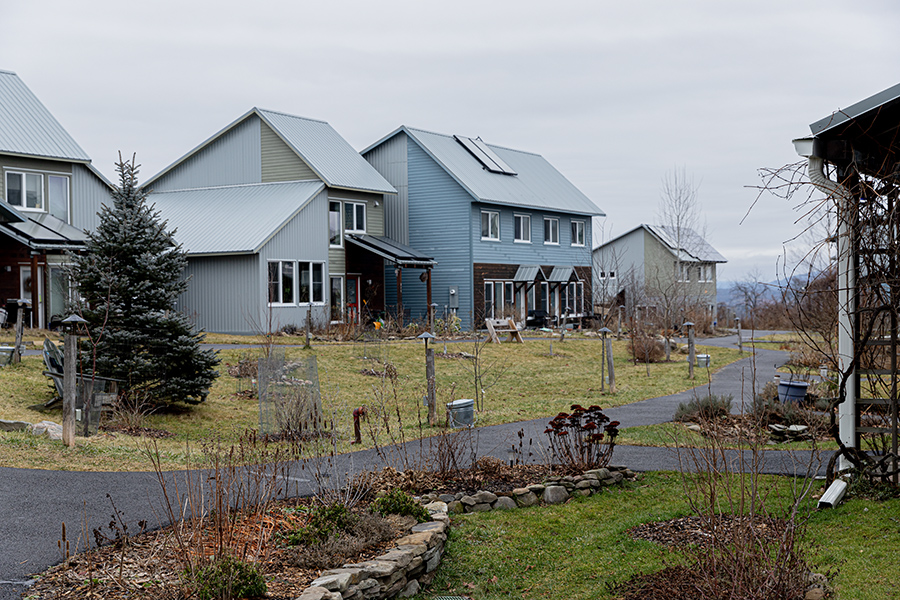Tucked in on Ithaca’s West Hill is EcoVillage, a sustainable living community that allows people of all ages to live in sustainably built homes and contribute to their communities. Within their three neighborhoods, FROG, SONG and TREE, and over 200 residents, there seems to always be something happening or being planned in the community.
On Jan. 27, the community held their annual event, Sparkfest. Sparkfest is an opportunity for community members to showcase their talents for about five minutes. There were singing groups, comedy acts, short routines and more planned for the evening.
The afternoon before the big event, the FROG common house was set up with resident’s artwork, ranging from textiles to handmade landscapes with gnomes tucked in, showcasing the other art forms the residents created. Many residents were there, chatting about each other’s work and catching up while also grazing the fondue table that had been also provided by the residents.

Ilona Bray, a resident since Spring 2022, is involved in a number of roles in the community, one being reading to the children of EcoVillage. However, at Sparkfest, she was reading something much different.
“I’m reading a takeoff poem. So last year we went to ‘Pirates of Penzance’ at Ithaca College, and I went home afterwards and that modern major general song was stuck in my head, so I wrote a takeoff of it, ‘I am the very model of an EVI new resident,’ and I’ll be reading it tonight,” Bray said.
Decisions in EcoVillage are done unanimously which can lead to a more timely process, but it allows for high involvement in the decisions. Proposals are made by community members who do research into updates and changes, and then they present it to the committee that the project resides under. The proposal goes to its first consensus meeting and the process continues from there.
There are a number of cohousing communities that use the consensus decision-making model, including Chapeltown Cohousing in the United Kingdom, Elderspirit Community in Virginia and others. According to The Cohousing Association of the United States, consensus voting is a highly inclusive process that preserves the ability of all voices to be heard despite its challenges.
Liz Walker, one of the co-founders of EcoVillage, said the main reasons that EcoVillage took on consensus decision-making was due to her background in activism work, but also because other cohousing communities had been using that model and it was successful.
“We chose that form of decision-making largely because that was my background as a community organizer,” Walker said. “I came from working in California in the anti-nuclear movement. We were trying to stop nuclear power plants and nuclear weapons, and that’s the form of decision-making we used in those activism groups. In addition to that, we also found out that other communities like this, using the cohousing model … were also using consensus.”

Sharon Markus, a resident of SONG neighborhood, is currently working with the committee to organize a network infrastructure project, looking to update the current hardware and allow for stronger connections.
“And that proposal goes to two meetings, and then we have a consensus vote,” Markus said. “And if it passes the consensus vote, and then we do it. If it doesn’t, if even just one person blocks, may say ‘No, I don’t want to do this,’ then we don’t do it. But hopefully, from working with the person who blocked, you say, ‘Why did you block, what is it that you want to be different?’ Sometimes things come back around.”
Markus said group decision-making is not easy or for the faint of heart, but it leaves an opportunity for growth personally and in the group setting.
“In my opinion, it’s been a wonderful opportunity for growth and character development because I’d like to think of myself as someone who is nice to people just generally, but if you don’t treat people respectfully or if there’s some kind of problem, you don’t treat people well, when you live in community, you’ll be seeing that person the next day at the laundry,” Markus said.
Wayne Gustafson, one of the artists and a resident with work on display in FROG common house, said that when living in community, it’s easy to feel combative because of how individuals are taught to function in society.
“One of the things that I say is that in our culture, we’re taught to be very individualistic,” Gustafson said. “We’re taught that things get worked out in an adversarial way. And even when we come here looking for something different, it still takes a while to kind of unlearn those patterns and be able to relate differently. So the whole thing is really a matter of, for all of us, no matter how long we’ve been here, it’s a constant educational process of helping us to learn to live differently.”
For many residents of EcoVillage, living sustainably is just a part of why the residents are choosing this housing; it’s also about having a supportive, involved community and finding purpose.
Amber Markus has been with the community for seven years and was an Ithaca resident growing up. She said the COVID-19 pandemic was a hard time for people in the community, but by having the sense of togetherness, they were able to lean on each other for help.
“There were some elders that were sick during COVID, and who lived alone, and had they lived in a traditional community, they wouldn’t have gotten the level of support that we were able to offer here,” Markus said. “When somebody needed medicine picked up, or they needed groceries, people would just make soup and go to CVS and get their meds and just check on them and walk their dogs for them, and all of that just comes from a place of love and community. I’ve just never seen anything like that before, so it’s just really neat.”
Ro Rasmussen, a tour guide and resident of EcoVillage, said the people who choose to live in the community want to communicate and connect with each other, especially to build trust between the members.
“Well, it’s kind of a self-selection, we all chose to come to live in a community, so that means we do want to spend some time with other people,” Rasmussen said. “I mean, we want to build up that trust. We want a community where we do things together and help each other, so that’s why we chose to be here.”

Gustafson said he came with his wife for three main reasons, the first being that they were looking for a place that was environmentally aware, trying to make the area better rather than just using it.
“A second one, we wanted to be a part of our community where people really worked on their differences as opposed to just getting mad and going to court because sometimes, we have different needs and we need to work stuff out,” Gustafson said. “Sometimes that’s really hard, but people tend to be committed to trying to do that. The third thing is we wanted something that had an educational mission. So things happen here that we all learn from, but we also have lots of visitors and tours and educational programs and all sorts of things. So people are coming through here all the time, learning about this kind of different way to live.”
EcoVillage offers free public tours on the last Saturday of each month, excluding November and December, giving the public the opportunity to learn about the cohousing model, farming and the stories of the people living together.
Bobbi Pollack joined EcoVillage seven years ago and since then has been highly involved in the community. She said one of her main searches when coming to EcoVillage was finding her purpose.
“It was, like I said before, to try to find a purpose,” Pollack said. “What was my purpose? And what’s important to me as I move, and I’m getting older and thinking about what I call transition is, I’m extremely grateful and appreciative and I make sure I spend a lot of time thinking about that every day.”
Appreciativeness of the community and connections made was another factor for Pollack, having made some playful friends who are also supportive of one another.
“But we’re just appreciative, we see a double rainbow, then people send out an email ‘double rainbow!’” Pollack said. “Or a full moon, it’s just what I would have thought — small things are now big things.”























